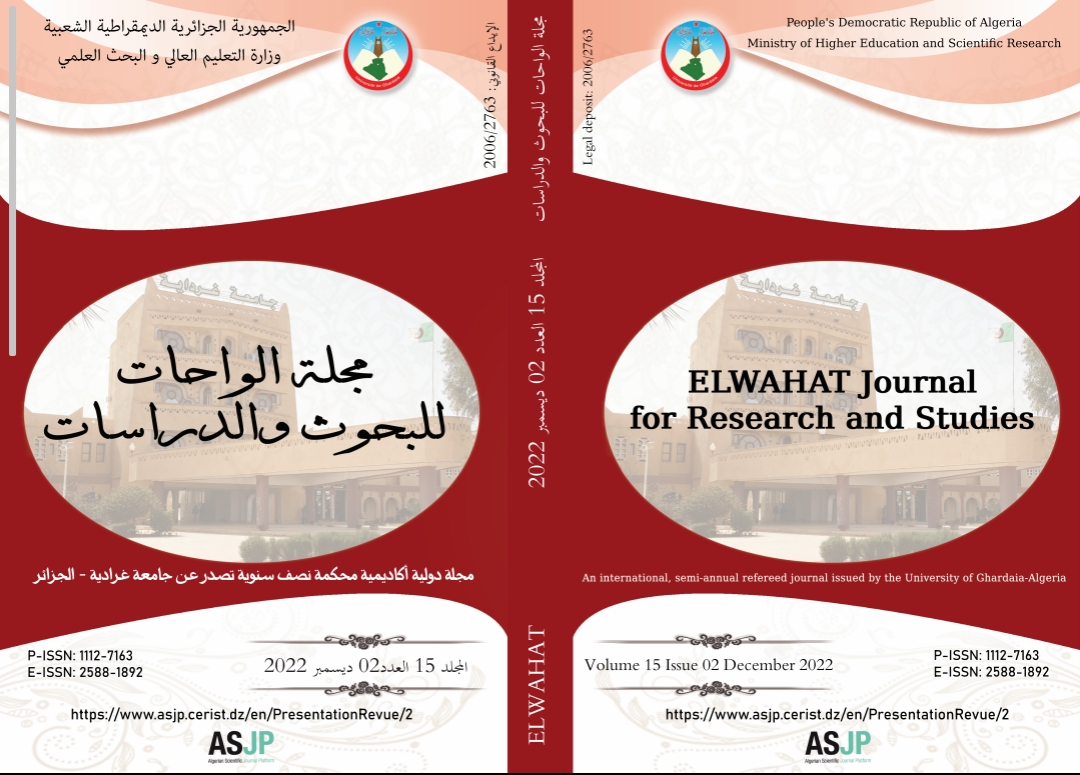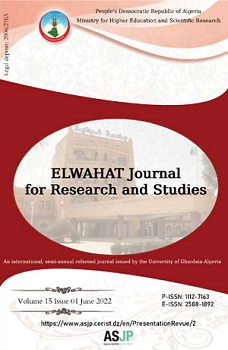Attitudes and Motivations for Code Switching among Mozabite Speakers in Ghardaia: A Sociolinguistic Study
Abstract
Abstract:
The Paper Is A Sociolinguistic Study Of Code Switching Among Mozabite Speakers In Ghardaia. It Examines The Language Choice Of Mozabite Speakers Within Different Domains, In Addition To Their Motivations And Attitudes Towards The Use Of Code Switching. To Reach The Objectives Of The Study, An Online Questionnaire Consists Of Five-Point Likert Scale Is Distributed To 235 Random Participants. The Data Analyzed Shows That The Vast Majority Of The Participants Predominantly Use Their Mother Tongue (Mzabi) At Home, With Family Members And When Discussing Personal Matters. However, They Tend To Mix Arabic And French With Mzabi Most Of The Time Outside Their Home, With Friends And When Discussing Business Matters. The Findings Also Show That The Respondents’ Motivations For Code Switching Range From The Lack Of Equivalents In Their Native Language, The Establishment Of Solidarity And Common Identity And The Need Of Feeling Confident In Addition To The Attraction Of Listeners’ Attention. Finally, The Results Of The Questionnaire Show That Mozabite Speakers Hold Positive Attitudes Towards The Use Of Code Switching.
Keywords: Sociolinguistics, Code Switching, Motivations, Attitudes, Mzabi, Arabic, French.
References
Appel, R., & Muysken, P. Language Contact and Bilingualism. Amsterdam University Press. Netherlands. 2006.
Auer, P. Bilingual Conversation. Amsterdam and Philadelphia: John Benjamins Publishing. United States. 1984.
Benrabah, M. “The Language Planning Situation in Algeria.” Current Issues in Language Planning, 6 (4): 379-502. 2005.
Fasold, R. The Sociolinguistics of Society. Oxford: Blackwell. United Kingdom. 1984.
Gumperz, J. J. Discourse Strategies (Vol. 1). Cambridge University Press. United Kingdom. 1982
Holmes, J. An Introduction to Sociolinguistics (second Ed.). Wellington: Longman. United States. 2000.
Hussein, R. “Code-alternation Among Arab College Students.” World English, 18(2): 281-289. 1999.
Jalil, A. Grammatical perspectives on code switching. ReVEL, 7(13), 1-11. 2009.
Lambert, W. E., Hodson, R. C., Gardner, R. C., and Fillenbaum, S. “Evaluational reactions to spoken languages.” Journal of Abnormal and Social Psychology, 66 (1), 44-51. 1966.
Lambert, W. E. “A social psychology of bilingualism”. Journal of Social Issues, 23 (2), 91-109. 1967.
Masoud, R. Code Switching: A Case Study of Computer Science Students at Jordanian State Universities. Unpublished M.A. Thesis, Yarmouk University, Jordan. 1999.
Miloudi, I. L’Alternance Codique dans les Pratiques Langagières des Algériens : Cas de L’Emission Télévisé Saraha Raha. Unpublished M.A. Thesis, M’sila University, Algeria. 2009.
Muysken, P. Bilingual speech: A typology of Code-mixing (Vol. 11). Cambridge University Press. UK. 2000
Poplack, S. “Sometimes I’ll start a Sentence in Spanish y Termino en Espanol: toward a typology of code-switching.” Linguistics, 18(7-8), 581-618. 1980.
Rietveld, T., & Van Hout, R. Statistics in language research: Analysis of variance. Walter de Gruyter. Germany. 2005.
Rouchdy, A. Language Contact and Language Conflict in Arabic: Variations on a sociolinguistic Theme. Routledge Curzon. UK. 2002.
Sharaf Eldin, A. T. “Socio Linguistic Study of Code Switching of the Arabic Language Speakers on Social Networking.” International Journal of English Linguistics; Vol. 4, No. 6. 2014.
Suleiman, Y. Language and society in the Middle East and North Africa: Studies in variation and identity. Curzon Press. UK. 1999.
Van Dalen, D. Understanding Educational Research: An Introduction, McGraw-Hill, Inc. New York. 1979.
Zirker, K. A. H. Intrasentential vs. intersentential code switching in early and late bilinguals. Brigham Young University. United States. 2007.







